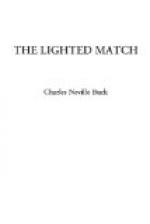Pagratide’s brows went up in evident annoyance and for an instant there was a defiant stiffening of his jaw, but when he spoke his voice held neither excitement nor surprise.
“Ah, indeed!” The exclamation was casual. He watched the glowing end of his cigarette for a moment, then magnanimously added: “However, since he has followed across three thousand miles, I had better see him.”
The host turned to the girl. “I’m borrowing this young man until dinner,” he vouchsafed as he led Pagratide to the door.
Cara stood watching the two as they passed into the hall; then her face changed suddenly as though she had been leaving a stage and had laid aside a part—abandoning a semblance which it was no longer necessary to maintain. A pained droop came to the corners of her lips and she dropped wearily into the broad oak seat of the inglenook. There she sat, with her chin propped on her hands, elbows on her knees, and gazed silently at the logs.
“Why did they have to come just now and spoil my holiday?”
She spoke as though unconscious that her musings were finding voice, and the half-whispered words were wistful. Benton took a step nearer and bent impulsively forward.
“What is it?” he anxiously questioned.
She only looked intently into the coals with trouble-clouded eyes and shook her head. He could not tell whether in response to his words or to some thought of her own.
Dropping on one knee at her feet, he gently covered her hands with his own. He could feel the delicate play of her breath on his forehead.
“Cara,” he whispered, “what is it, dear?”
She started, and with a spasmodic movement caught one of his hands, for an instant pressing it in her own, then, rising, she shook her head with a gesture of the fingers at the temples as though she would brush away cobwebs that enmeshed and fogged the brain.
“Nothing, boy.” Her smile was somewhat wistful. “Nothing but silly imaginings.” She laughed and when she spoke again her voice was as light as if her world held only triviality and laughter. “Yet there be important things to decide. What shall I wear for dinner?”
“It’s such a hard question,” he demurred. “I like you best in so many things, but the queen can do no wrong—make no mistake.”
A sudden shadow of pain crossed her eyes, and she caught her lower lip sharply between her teeth.
“Was it something I said?” he demanded.
“Nothing,” she answered slowly. “Only don’t say that again, ever—’the queen can do no wrong.’ Now, I must go.”
She rose and turned toward the door, then suddenly carrying one hand to her eyes, she took a single unsteady step and swayed as though she would fall. Instantly his arms were around her and for a moment he could feel, in its wild fluttering, her heart against the red breast of his hunting-coat.
Her laugh was a little shaken as she drew away from him and stood, still a trifle unsteady. Her voice was surcharged with self-contempt.




